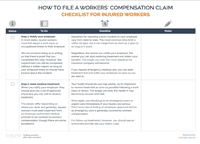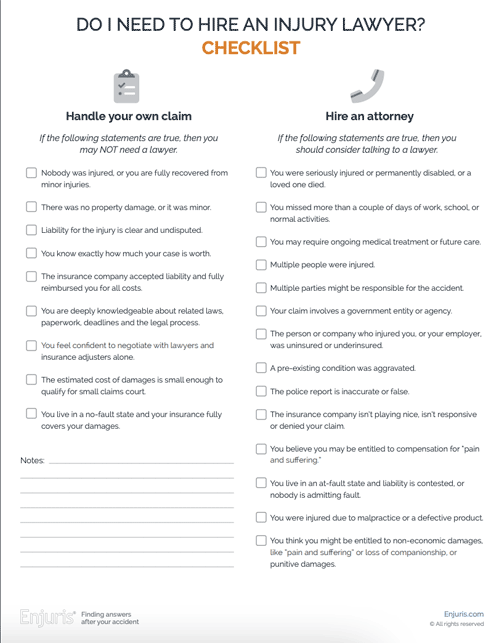
Here’s what to know about the process for filing an Illinois workers’ comp claim
To file an Illinois workers’ comp claim, you must report the injury to your employer, seek medical treatment, and submit a claim with the Illinois Workers’ Compensation Commission (IWCC) if necessary. Employers and insurers sometimes delay or deny claims, so understanding the process is key. If you face challenges, a workers’ compensation attorney can help protect your rights and secure the benefits you deserve.
Workers’ compensation exists for your benefit if you’re an Illinois employee.
The Illinois Workers’ Compensation Commission (IWCC) oversees workers’ comp claims and resolves disputes between employees and employers regarding work-related injuries.
Workers’ compensation is a no-fault insurance system that is an exclusive remedy if you’re injured at work. In other words, the employee does not need to prove that their injury was caused by the employer’s negligence like they would in an Illinois personal injury lawsuit, but they cannot file a lawsuit against the employer for an injury for which they’re receiving workers’ comp benefits.
What injuries are eligible for Illinois workers’ compensation benefits?
You may claim workers’ compensation benefits if you suffered an injury at your workplace or off-site while you were engaged in tasks required by or related to your job.
Injury reporting in Illinois workers’ compensation claims
You must report the accident or injury to your manager as soon as possible in writing or verbally. However, if you fail to report it within 45 days, you could lose your ability to claim benefits.
There are two exceptions to this rule: First, if the injury is related to excessive radiation exposure, you have 90 days in which to report. Second, if the condition is not immediately apparent, you may report as soon as possible once you’ve discovered the disease.
Although Illinois workers' compensation law provides for verbal notice, it’s advised to provide written notice.
Written notice should include:
- The date and location of the injury
- A description of the incident, injury, or illness
- Your contact information (even though your employer likely has this on file)
Remember, the person who receives notice must be a person with leadership or managerial capacity and authority, or it could be the person in charge of the employer’s human resources.
Once the claimant has notified their employer of an injury, the employer has 30 days in which to file the accident report with the IWCC.
How to file an Illinois workers’ compensation claim
Cases are filed in CompFile
CompFile is the IWCC’s system for filing claims. You must file and then access your claim through CompFile online. You may register and choose “pro se” as the user type if you do not have an attorney and are representing yourself.
Once your email is verified, you use the “Application for Adjustment of Claim” form to file. Although you must notify your employer within 45 days of an injury, you may file a claim with the IWCC within three years of the date of the injury.
You can log in to CompFile anytime to track the status of your claim. You will have a status call with an arbitrator to discuss your claim, and then followup status calls every three months.
You will need to show three things if you proceed to an Illinois workers’ comp hearing to prove your eligibility for benefits:
- Your employment status at the time of the injury;
- That the injury or illness happened at work; and
- You provided notice to your employer.
However, if you have an emergency and require a quick decision on benefits, you may request a 19(b) hearing. The Illinois Workers’ Compensation Act § 19(b) permits a claimant to request an immediate hearing to determine what they’re owed for medical treatment or lost wage benefits. You can only request an immediate hearing if you have not yet returned to work and are claiming fewer than 12 weeks of unpaid benefits.

Download this checklist for injured workers to learn how to file a workers’ comp claim and track your progress.
Download in PDF format
Communication with employer and insurer
When you file an initial claim, your employer should provide you with a list of approved medical providers. Your employer begins the process of contacting the insurer. However, the claimant can and should also be in regular contact with the employer and insurance provider about the claim.
You can log into CompFile to check the status of your claim. You can also contact the IWCC at (866) 352-3033 or [email protected].
Why might your Illinois workers’ compensation claim be denied?
There are a couple of reasons why an employer could refuse to pay a work injury claim:
- The accident happened outside of work;
- The employee did not report the injury or seek medical attention in a timely manner;
- The employee was intoxicated or impaired by drugs at the time of the accident;
- The injury happened outside of work hours;
- The employer disputes the nature of the injury or the facts of the incident.
Should you get a workers’ compensation attorney?
Yes, if your claim is disputed, denied, or partially denied. You might also wish to seek the guidance of a workers’ comp lawyer if you suffered a severe injury that will require future or ongoing treatment. Your lawyer can help determine the financial cost of your future treatment—because once your claim is settled, you can’t go back and request more if your expenses end up being greater than you anticipated.
If you have questions about the claims process, hearings, appeals, or a claim dispute, you can contact an Illinois workers’ compensation lawyer for guidance through the workers’ comp system.

Can you handle your own claim, or should you hire an attorney? Use this worksheet to determine when you should consider hiring a personal injury or workers' comp lawyer.
Download in PDF format
See our guide Choosing a personal injury attorney.
